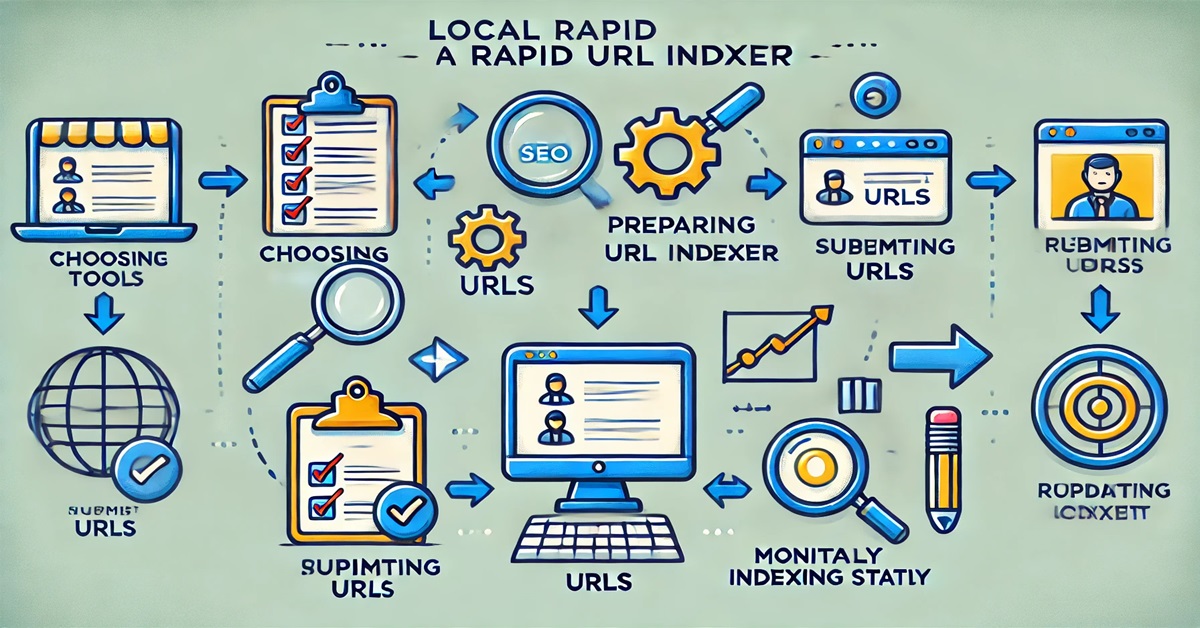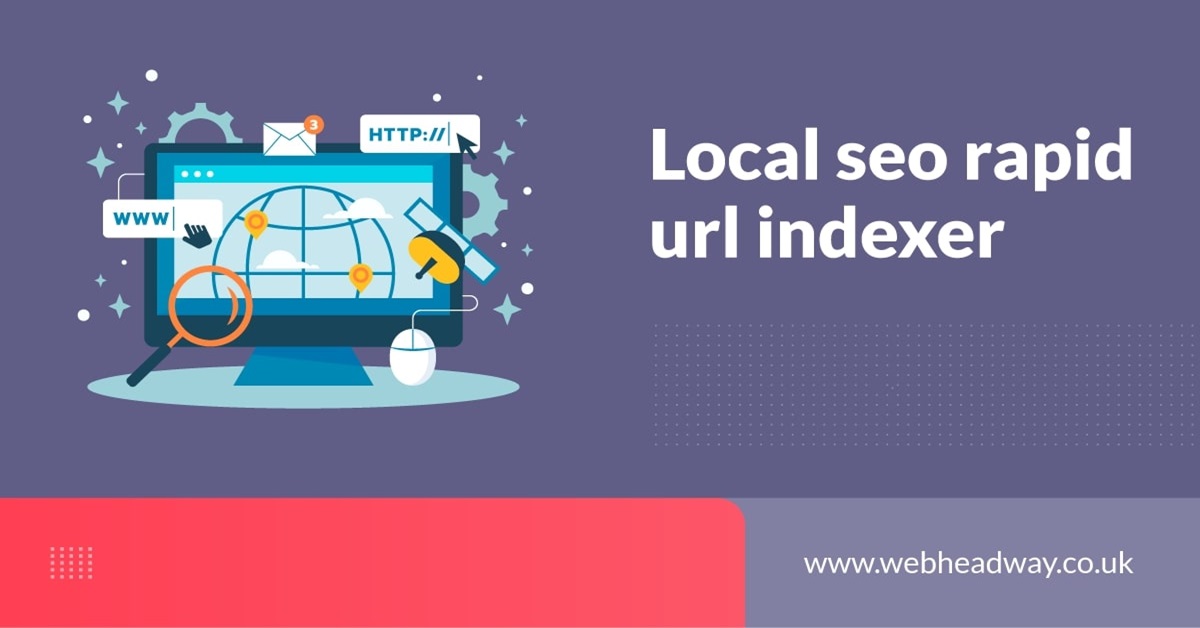Table of Contents
ToggleLocal SEO Rapid URL Indexer
Local SEO is essential for businesses that aim to attract more customers in their local area. It helps local companies show up in searches for nearby products or services. You need more than just a website in the modern digital environment. Your web pages must be easy for search engines like Google to find and index. Fast indexing of your pages boosts your online visibility. It helps your business rank higher in search results. It will reach more local customers.
In this post, we will explore the benefits of using a rapid URL indexer for local SEO. You’ll learn how these tools can improve your local search rankings. They do this by indexing your web pages faster. We’ll provide step-by-step guidance on using these tools. We’ll also share tips to boost your local search presence.
For local businesses, rapid indexing is crucial. Quick indexing of a business’s web pages means it can appear in search results sooner. This allows more potential customers to find its services. This is crucial for businesses in competitive fields. In those industries, a high search rank can attract customers before your competitors do. Rapid URL indexing tools offer a solution to this, helping local businesses gain visibility and maintain a competitive advantage.
What is Local SEO?

Understanding Local SEO
Local SEO (Search Engine Optimisation) improves a business’s online presence. It helps people find it when searching for nearby services or products. Local SEO makes sure local businesses show up in searches for terms like “plumber near me” or “best pizza in London.” Optimising a website for local searches can help businesses. It can show them to potential customers at the right time. This boosts their chances of attracting more local clients.
Key Elements of Local SEO
- Setting up Google My Business: A key step in local SEO is to create and optimise a Google My Business (GMB) profile. It makes companies more visible on Google Maps and in local search results. Customers can then find key details like opening hours, contact info, and directions.
- Building Local Citations: Citations are online mentions of a business’s name, address, and phone number (NAP) in local directories, like Yelp and TripAdvisor. Accurate info on all platforms builds trust in the business’s location and credibility. It helps search engines.
- On-page SEO for Local Keywords: This means using local keywords on your website. For example, include the city or neighbourhood where you base your business. A Manchester bakery should use “Manchester bakery” and “best cakes in Manchester” in its website content and meta tags.
- Local Link Building: Links from local sites can boost a business’s SEO. These sites include nearby businesses and community groups. These links endorse your business. They prove to search engines that it is relevant and trusted in the local area.
Why It’s Important for Local Businesses
Local SEO is vital for businesses that depend on local customers. They appear highly in search results as a result. This leads to more foot traffic and inquiries. High online visibility boosts search result click-through rates. This drives more visitors to a business’s website. As more locals find the business, it will see higher sales and better customer loyalty. So, local SEO is key for growth.
What is a Rapid URL Indexer?
Simple Definition
A URL indexer is a tool that helps search engines, such as Google, discover and add web pages to their databases. When search engines index a page, they add it to their database. They can now show it in search results for relevant queries. Without indexing, a web page won’t show in search results. This makes it hard for customers to find it.
Comparing Traditional vs. Rapid Indexing Methods
Traditional indexing methods can be slow. They can take weeks to index a new or updated page. This delay can be a challenge for businesses that need their content to be visible as soon as possible, especially in competitive industries. Rapid indexing tools speed up this process. They allow pages to get indexed in hours or days instead of weeks. This lets businesses reach their audience sooner. It increases the chances of attracting customers before competitors do.
The Role of URL Submission Services in Local SEO
When you submit URLs to search engines, you help ensure that they find new or updated content without delay. Informing search engines about your web pages speeds up their inclusion in search results. This is especially beneficial for local businesses. Fresh, indexed content can improve search rankings. It helps customers find your services faster.
How Do Local SEO Quick URL Indexers Operate?
A Step-by-Step Guide to Using a Rapid Indexing Tool
Step 1: Submit URLs for Indexing. First, submit your web page URLs using tools like Google Search Console or SEO software. This informs search engines that the pages are ready for indexing. Paste the URL into Google Search Console. Then, request indexing.
Step 2: Pinging Search Engines Some indexing tools will “ping” search engines after submission. This notifies them about the new or updated pages. Pinging acts as a reminder to search engines, prompting them to crawl and index your content sooner.
Step 3: Monitor the Indexing Status in Real-Time. After submitting and pinging, use tools to track your pages’ indexing status. For example, you can use Google Search Console to check if your pages are indexed. It also tracks their performance over time.
Step 4: Confirm Indexing and Troubleshoot if Needed If a page isn’t indexed, investigate the issue without delay. This may involve resubmitting the URL or checking for broken links. It may also require ensuring the content meets search engine quality guidelines.
Benefits Over Traditional Methods
Using a rapid URL indexer can reduce the time for a page to appear in search results from weeks to a few days or even hours. This fast process can help businesses stay at the top of local search rankings. It ensures their content reaches potential customers in a timely manner.
Why Use a Local SEO Rapid URL Indexer?
Get Indexed Faster and Increase Visibility
A rapid URL indexer will index your web pages in a short amount of time. This helps them appear in search results sooner. The faster search engines index your pages, the quicker customers can find your site when searching for local services. This can boost website traffic. Your content will be more accessible to those seeking nearby businesses like yours. Rapid indexing gives you a head start, allowing you to reach your target audience before your competitors do.
Improve Local Search Rankings
Being in search results soon after publishing can boost your local rankings. Fast, indexed web pages are more likely to rank high in local searches, like Google’s “Local Pack.” A higher rank means more visibility. It can bring more local customers to your business. This helps local businesses in competitive markets, where every advantage counts.
Monitor Your Progress in Real-Time
With rapid URL indexing, you can track which pages index and how they perform in search results. Tools like Google Search Console let you track progress in real-time. They show which pages need more work. If issues arise, such as a page not indexing, you can take immediate action to fix it.
Enhanced Crawling Efficiency
Rapid indexing helps search engines understand your content better. It makes it easier for them to crawl and categorize your pages. This can boost your SEO. Search engines prefer updated and relevant websites. The faster search engines understand your content, the better your chances of ranking well in local searches.
The advantages of using a quick URL indexer for local SEO
Index New or Updated Pages Without Delay
A rapid URL indexer’s main advantage is its ability to alert search engines to new or updated web pages without delay. Rapid indexing lets search engines quickly update search results. This includes changes from a new blog post, a product listing, or updates to existing content. It keeps your website current and competitive.
Support for Multiple URLs
Automated indexing tools can handle several URLs at the same time, which increases the efficiency of the process. By submitting multiple URLs at once, you can save time and effort compared to manually submitting each page. This is especially helpful for businesses with large websites or regular content updates.
Helps Manage Online Reputation
Rapid indexing can be an effective way to manage your online reputation. If negative reviews appear online, use rapid indexing. It will push positive content up the search results. This makes it more likely that customers will see good info about your business first. This approach helps maintain a positive brand image.
Real-World Success Stories
Many businesses have seen improved local SEO results after using rapid indexing tools. A local restaurant updates its menu online. It saw a big increase in bookings after its new pages ranked higher in local search results. A small plumbing business achieved a high ranking for emergency service searches. They did this by getting new service pages indexed fast. It helped them attract urgent customers.
How to Implement a Local SEO Rapid URL Indexer: A Step-by-Step Guide

Step 1: Choose the Right Indexing Tool
The first step is to select a rapid indexing tool that fits your needs. Look for features such as real-time monitoring, which allows you to track when your pages get indexed. Integration with tools like Google Search Console can help. It allows direct URL submissions and easy monitoring. Also, consider the ability to submit multiple URLs at once and to ping search engines automatically.
Step 2: Prepare Your URLs
Before submitting your URLs for indexing, ensure that your content has complete optimization for local SEO. This includes using local keywords, like city or neighbourhood names. Also, ensure your on-page SEO—like meta titles, descriptions, and header tags—is in place. Also, the content must be valuable and useful to users. Search engines are more likely to index high-quality content quickly.
Step 3: Submit URLs for Indexing Using SEO Tools
There are various ways to submit URLs for indexing. Google Search Console is a popular tool for submitting URLs. paste the URL and request indexing. Some specialised SEO tools offer more advanced features, such as bulk URL submission and automated pinging. These tools can speed up the process by notifying search engines to crawl and index your pages. These tools are great for local SEO. It’s vital to appear in search results without delay.
Step 4: Monitor the Indexing Status at regular intervals.
Once you’ve submitted your URLs, it’s important to keep an eye on their indexing status. Use tools like Google Search Console to check if the search engines have indexed the pages. Regular monitoring will help you spot problems. These may include a page that isn’t indexed or issues with the content. This allows you to take prompt actions, such as resubmitting the URL or fixing any indexing issues.
Step 5: Regularly Update Content and Resubmit if Necessary
Fresh, relevant content is key to staying visible in search results. Update your web pages frequently, especially when they contain time-sensitive information. Also, add new content often. Whenever you make significant changes to your pages, resubmit the URLs for indexing to let search engines know there’s new content to crawl. Periodic resubmission can also help reinforce your site’s relevance to local search queries.
Best Practices for Using a Local SEO Rapid URL Indexer
Avoid Overusing the Indexer
Rapid URL indexing is a powerful tool. However, submitting too many URLs at once can appear suspicious to search engines. It may trigger spam filters. It’s important to avoid overusing the indexer and submitting large batches of URLs in a short period. Instead, spread out submissions over time. Focus on high-quality content. This will maintain a natural indexing pattern and avoid penalties.
Focus on High-Priority Pages
Index new or updated content first. It must be relevant to your target audience. For local businesses, this might include new service pages, blog posts with local event info, or homepage updates. Focus on high-priority pages. This will index your best content quickly. It will also improve your chances of ranking well in local search results.
Combine Indexing Efforts with Other SEO Strategies
Including rapid indexing in a larger SEO plan is a good idea. To get the best results, also use on-page SEO. This includes using relevant local keywords, building local citations, and getting quality backlinks. These strategies will boost your site’s authority and relevance. They’ll work with rapid indexing.
Monitor Analytics to Track Performance
Use tools like Google Analytics to monitor your indexed pages’ performance. Check metrics like organic traffic, click-through rates, and keyword rankings. They show how your pages perform after indexing. Frequent reviews of this data will help you. It will let you adjust your strategies and focus on what works best for your local SEO efforts.
How to Choose the Right Local SEO Rapid URL Indexer
What Features to Look For
When choosing a rapid URL indexer, consider key features. Real-time tracking is one of them. It lets you monitor indexing progress. Bulk URL submission capabilities can assist you with the frequent updates of multiple pages. Choose tools that are easy to use and straightforward to navigate.
Comparison of Popular Tools
Several rapid indexing tools are popular among local SEO professionals. For example, Google Search Console is a free option. It allows manual URL submission and tracking. Specialised tools like IndexNow and Instant Indexing for WordPress offer advanced features. They include automated URL submission and bulk indexing. Choose a tool that aligns with your needs and budget, while providing reliable indexing performance.
Integration Capabilities
Ensure the tool you choose integrates well with other SEO platforms. For instance, if you use Google Search Console for monitoring, select an indexer that integrates well with it. Also, if your website is on WordPress, look for plugins. They should enable automated submissions and easy indexing management.
Common Mistakes to Avoid When Using Rapid URL Indexers
Submitting Too Many URLs in One Go
Submitting a large number of URLs all at once can raise red flags for search engines, leading to penalties or delays in indexing. Search engines may view this as an attempt to game their systems. It could harm your site’s reputation. To avoid this, spread out your submissions. Focus on the most important pages first.
Ignoring the Indexing Status
It’s essential to monitor the progress of your submitted URLs on a regular basis. If you ignore the indexing status, you may miss issues that prevent some pages from being indexed. Tools like Google Search Console can help you track indexed pages. You can then take action, like resubmitting URLs or fixing issues.
Not Combining with Broader SEO Efforts
Relying solely on quick URL indexing is not enough to improve your website’s local SEO. Indexing alone doesn’t guarantee higher rankings; it’s one part of a successful strategy. Combine rapid indexing with other SEO tactics. These include optimising on-page content, building backlinks, and maintaining local citations. These efforts will support rapid indexing and help achieve better search visibility.
The Role of Rapid URL Indexing in Online Reputation Management
Quickly Addressing Negative Content
Rapid URL indexing can help manage your online reputation. It’s useful for dealing with negative content or reviews. If negative information about your business surfaces, it can hurt you. Rapid indexing allows you to push out fresh, positive content with speed. This gives you a chance to counteract any negative impact. This can help control your brand’s narrative while search engines process the new info.
Using Indexing to Push Positive Content Higher
To improve your online reputation, prioritise indexing content that portrays your business in a positive light. Focus on recent customer testimonials, success stories, and new service announcements. By indexing this content in a timely manner, you can boost its search rank and push down negative results. This strategy can help ensure potential customers see positive info first. It will improve your brand’s image and trustworthiness.
Commonly Asked Questions (CAQs)
A local SEO rapid URL indexer helps speed up the process of getting your web pages indexed by search engines like Google. When search engines index a page, it becomes visible in search results, making it easier for potential customers to find your business. Rapid indexers notify search engines of your new or updated content. This ensures it appears in search results much sooner than with traditional methods.
Yes, when implemented correctly, rapid indexing generally ensures safety for SEO. However, it’s important not to overuse these tools by submitting too many URLs at once, as this could raise suspicion with search engines. Moderate use of rapid indexing, with other SEO strategies, can boost your site's visibility. It won't cause any harm.
Not possible to remove the adverb. Many rapid indexing tools let you submit multiple URLs at once. This makes it easy to index several pages. This is highly beneficial for businesses that frequently add new content or update numerous web pages. Prioritise high-priority pages and submit URLs in stages to avoid potential penalties.
For quick indexing and better local SEO, use these tools: Google Search Console, IndexNow, and the Instant Indexing plugin for WordPress. Each tool has different features. They include bulk submission, automated pinging, and real-time monitoring. These tools help manage indexing efforts.
If a page isn't indexed within a short time, check for issues. Look for broken links or duplicate content that might block indexing. You can also try submitting the URL through Google Search Console or another rapid indexing tool. Also, ensure the content is valuable and follows SEO best practices. Search engines are more likely to index high-quality content in a short amount of time.
Related Articles and Resources
Search Engine Journal – Website Indexing: How Does It Work?
This guide explains the process of indexing and how search engines like Google and Bing find and rank pages. It also includes tips for getting pages indexed quickly, such as using sitemaps and URL submission tools.
AIOSEO – What is Indexing in SEO? A Beginner’s Guide
This beginner-friendly guide explains what indexing is and why it’s important for SEO. It covers practical steps like submitting sitemaps to Google Search Console, using the IndexNow protocol, and optimising the robots.txt file to improve indexing.
Moz – Google SEO Tips to Index New Content Faster
Moz provides helpful strategies for getting new content indexed more quickly, including best practices for internal linking and using Google Search Console’s URL inspection tool to request indexing.
Google Search Central – Technical SEO Guidelines
Google’s own resource provides detailed guidelines on technical SEO, including how to control crawling and indexing on your site. It’s a reliable source for understanding how to use tools like the robots.txt file and sitemaps for better indexing.
Final Thoughts: SEO Strategy with Rapid URL Indexing
Rapid URL indexing helps local businesses boost their online presence. Indexing your web pages in a timely manner can boost visibility and local search rankings. It will also help you reach potential customers sooner. This indexing approach lets businesses outpace competitors. It helps them manage their online reputation and boost website traffic.
Now is the perfect time to implement these techniques and take your local SEO strategy to the next level. First, choose the right indexing tools. Then, optimise your content. Finally, combine rapid indexing with other SEO practices. This will boost your search engine visibility and attract more customers.
If you’re ready to see the difference rapid indexing can make, reach out for a free consultation. Our SEO experts can guide you through the process and help you maximise your local SEO efforts.








